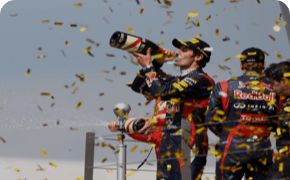While Mercedes and the similarly-powered Williams and McLaren teams were racking up around 300 laps over the four days, world champions Red Bull remained on the back foot, managing little over 100. We review this and the other major talking points in Sakhir…
Mercedes in pole position
There’s no denying that Mercedes are the current favourites for victory at next month’s season-opening Grand Prix in Australia. Not only did Nico Rosberg and Lewis Hamilton clock the fastest times of the week in Bahrain, they put in 315 laps between them - a total only surpassed by Williams - and carried out both qualifying runs and race simulations in impressively efficient fashion.
Rosberg’s fastest lap of 1m 33.283s, set on Pirelli’s soft compound tyre, was within a second of his 2013 pole time at the circuit, proving that the 2014 cars are no slouches, and he could almost certainly have gone quicker, especially with a set of supersofts. Mercedes’ running was not without its problems, but being further down the development path than many rivals meant the team could diagnose and resolve issues quickly and get the F1 W05 back on track, ironing out the kind of difficulties others may not even discover until Melbourne.
It was generally good news for the other Mercedes-powered teams, too. McLaren’s MP4-29 was consistently on the pace, while Williams were sufficiently confident of their progress to spend significant time practising pit stops and to give an F1 rookie - new tester Felipe Nasr - a complete day in their FW36. Force India had one or two problems with the VJM07 in Bahrain, but it too looked capable of a decent turn of speed.
Lotus - and Renault - recovering
After missing the opening test in Spain, Lotus had a lot to do in Bahrain. Predictably, their programme with the asymmetric-nosed E22 did not run entirely smoothly - only Marussia completed fewer laps - but things improved each day, with the last being the team’s most productive.
Encouragingly, Pastor Maldonado also set the fastest time for a Renault-powered car. Less encouraging was the fact that it was over five seconds off Rosberg’s leading pace. Renault admit they are still playing catch up, but at least their reliability looks to have improved, as shown by the 253 laps chalked up by Caterham.
Red Bull yet to bounce back
After managing a meagre 21 laps in Spain, Red Bull were hoping for dramatic improvement in Bahrain. There was improvement, but it was far from startling. They completed 116 laps - fewer than anyone bar Lotus and Marussia - and Daniel Ricciardo’s best lap of 1m 39.837s put them just 15th on the aggregate timesheet. The team were pleased to have resolved the problems of Jerez, but then kept running into new ones - and with the engineers still getting to grips with working on such a radically different machine, fixing them was rarely the work of a moment. That, of course, was an issue affecting most teams - Ferrari technical chief Pat Fry suggested that jobs on the 2014 cars are currently taking around twice as long as on their 2013 counterparts.
The dark (prancing) horse
While the headlines tended to focus on Mercedes’ might and Renault’s plight, it was more a case of ‘no news is good news’ at Ferrari. Fernando Alonso and Kimi Raikkonen totalled a highly respectable 287 laps, and just two-tenths of a second separated their best times, suggesting a fascinating battle in prospect between the two former champions this season. They finished sixth and seventh respectively in the aggregate times and, along with Esteban Gutierrez in the Ferrari-powered Sauber, were the only non-Mercedes runners in the top 12. The only slight blot on the landscape was Raikkonen’s late crash in the final ten minutes of the week, one that highlighted the increased torque of the 2014 power units - something all drivers will need to be wary of this year, both in terms of driving style and managing tyre wear.
Marussia on the back foot
After beating perennial rivals Caterham to tenth in the 2013 constructors’ standings, Marussia were hoping to carry that momentum into the new campaign. Unfortunately for the Banbury-based team, they experienced several technical issues at the first test in Jerez, and they were similarly beset by difficulties in Sakhir. The John Booth-led squad bounced back from a computer virus on the first day of running, only to encounter a number of other issues which contributed to their position at the bottom of the mileage charts. On the plus side, things can only get better.
Williams’ second Felipe
It seems one Brazilian driver named Felipe wasn’t enough for Williams. Joining veteran countryman Massa, 21-year-old Felipe Nasr was announced as the team’s new test driver on Saturday morning. They wasted no time in putting him in the car, as that same day he got his very first taste of F1 machinery. And a very impressive debut it was too: 87 laps, fourth fastest on the day, and 12th quickest of the 24 drivers in the week’s aggregate timesheet.
















